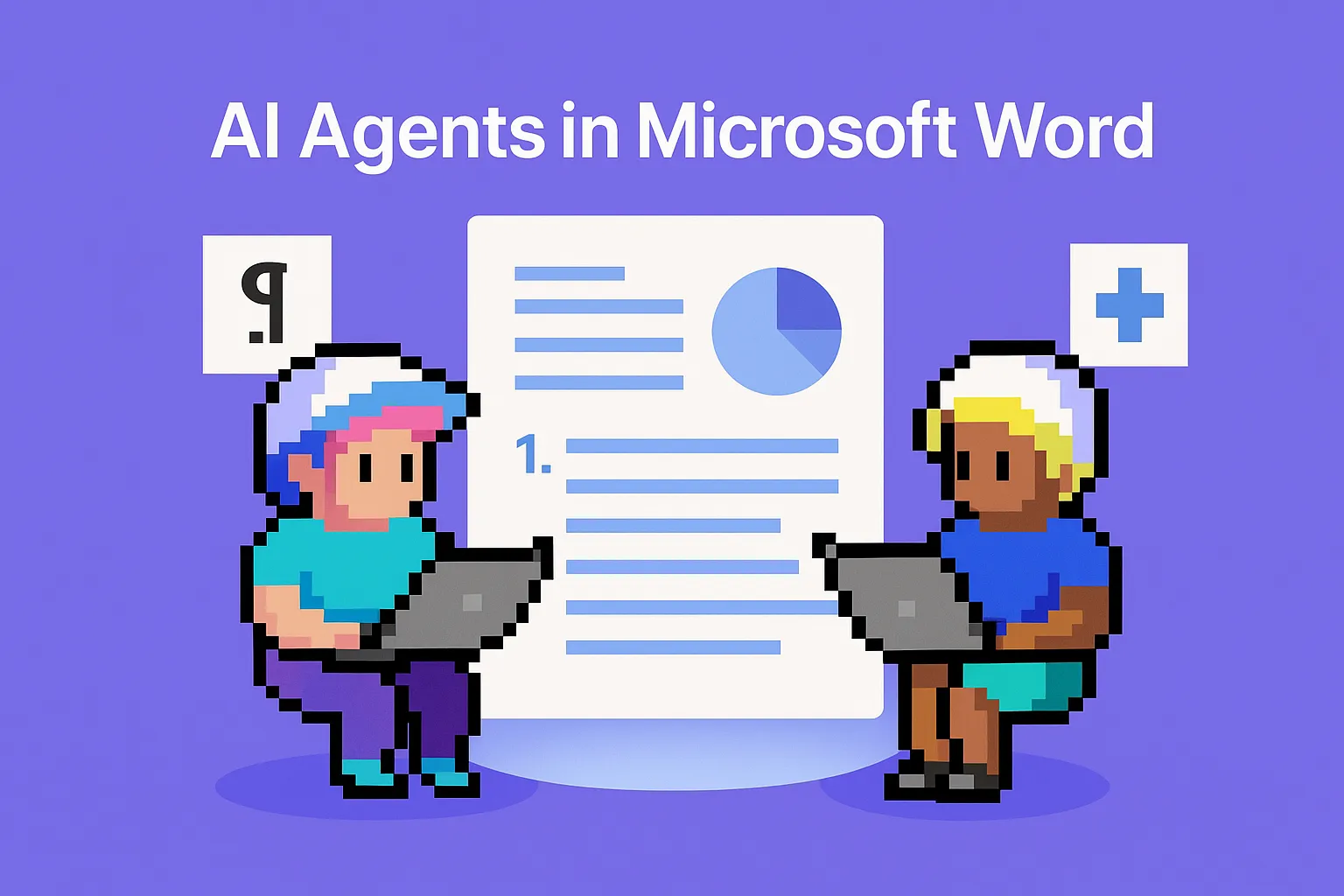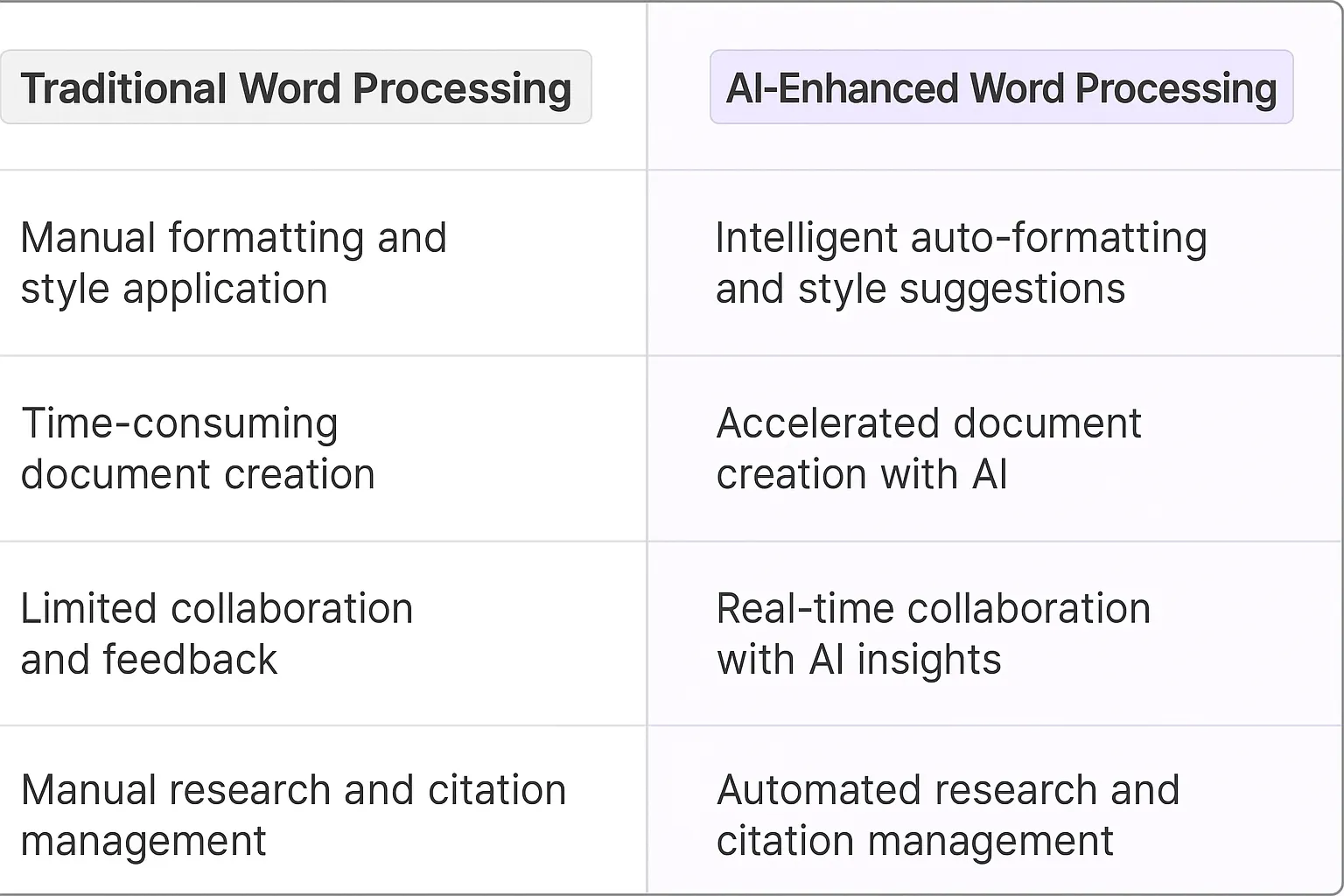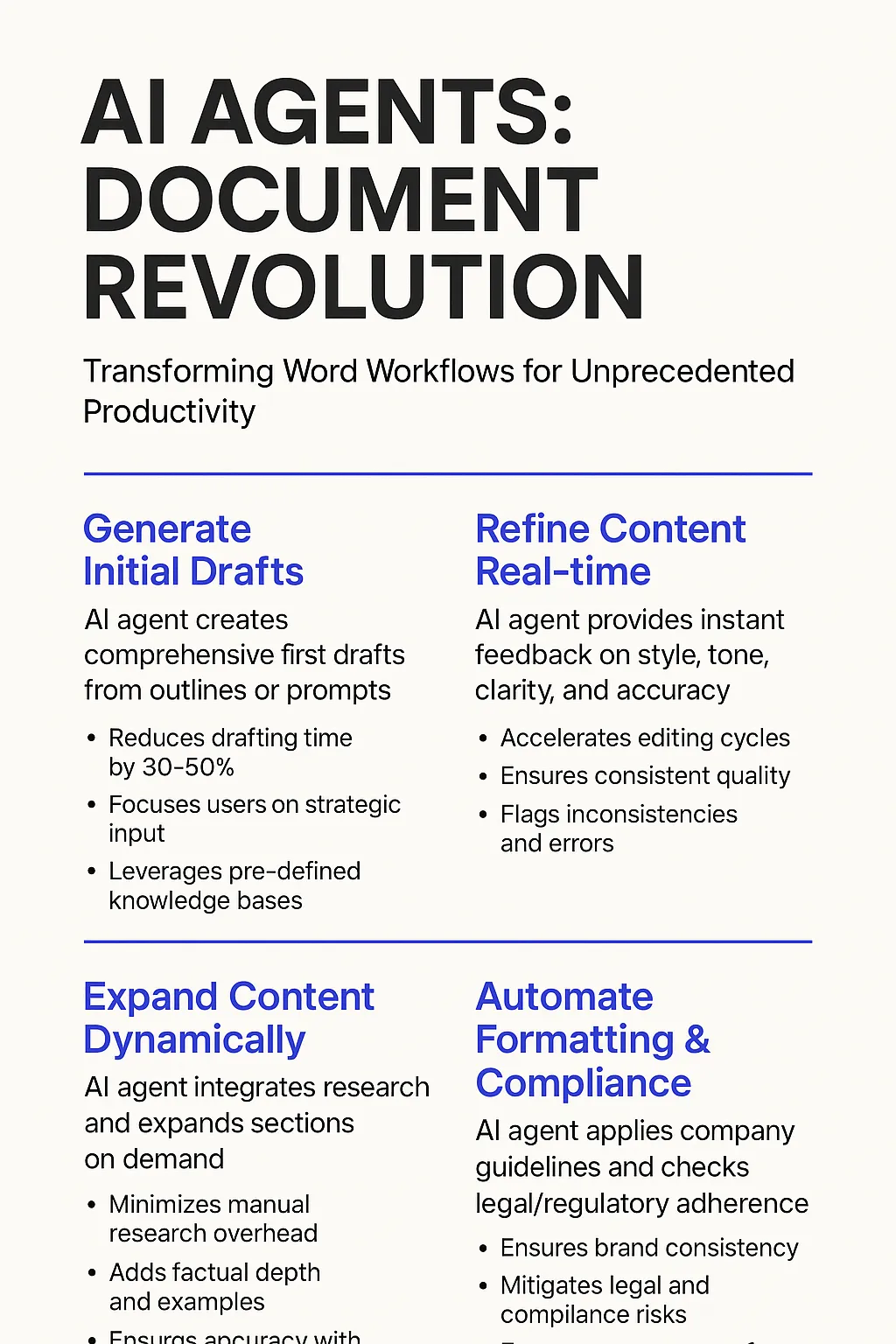Microsoft Word AI Agents
Understanding Microsoft Word
Microsoft Word is the heavyweight champion of word processing software. It's been the go-to tool for creating documents since the 1980s, evolving from a basic text editor to a sophisticated platform for content creation. Word is like the Swiss Army knife of writing tools - it's versatile, powerful, and found in virtually every office around the globe.
Word's feature set is deep and wide. We're talking about a tool that can handle everything from simple memos to complex reports with embedded multimedia. Some standout features include:- Advanced formatting and styling options- Real-time collaboration tools- Integration with other Microsoft Office apps- Robust review and tracking changes functionality- Template library for quick document creationBut here's the kicker - with AI agents entering the scene, these features are getting supercharged. It's like Word is hitting the gym and coming back with capabilities we couldn't have imagined a few years ago.

Benefits of AI Agents for Microsoft Word
What would have been used before AI Agents?
Before AI agents entered the scene, Microsoft Word users were stuck in a world of manual labor and cognitive overload. They'd spend hours poring over style guides, wrestling with formatting, and second-guessing their grammar choices. The more ambitious among us might have used add-ons or macros, but let's be real - those were like putting racing stripes on a horse-drawn carriage.
Writers and professionals relied on a mishmash of tools: spell-check (which we all know has its limitations), thesauruses (both digital and dusty), and maybe even a long-suffering friend or colleague for proofreading. The result? A fragmented workflow that was about as efficient as trying to win a marathon in flip-flops.
What are the benefits of AI Agents?
Enter AI agents for Microsoft Word, and suddenly we're playing a whole new ballgame. These digital teammates are like having a world-class editorial team at your fingertips, but without the attitude or coffee breaks.
First off, they're context-aware in a way that makes previous tools look like they're using smoke signals to communicate. An AI agent doesn't just correct your grammar; it understands the nuances of your writing style and adapts accordingly. It's like having a writing coach who's read everything you've ever written and knows your voice better than you do.
But here's where it gets really interesting: these AI agents are learning machines. They're constantly evolving, picking up on the latest language trends and style preferences. This means your writing isn't just correct - it's current. In a world where the half-life of relevance is shrinking faster than a wool sweater in a hot dryer, that's a game-changer.
Moreover, AI agents in Word are breaking down the barriers between ideation and execution. They can generate outlines, suggest compelling introductions, and even help structure your arguments. It's like having a brainstorming partner who never runs out of ideas and doesn't steal your snacks.
The real kicker? These AI agents are democratizing high-quality writing. They're leveling the playing field, giving everyone access to tools that were once the domain of professional editors and writing coaches. It's like we've gone from a world where only a select few had access to the best gym equipment, to suddenly everyone having a personal trainer in their pocket.
In essence, AI agents in Microsoft Word are turning what was once a solo sport into a tag team event. And in this match, everyone's a winner - except maybe the traditional grammar book industry. Sorry, Strunk and White.

Potential Use Cases of AI Agents with Microsoft Word
Processes
AI agents in Microsoft Word are game-changers for document creation and editing. They're not just fancy spell-checkers; they're digital teammates that can transform your writing process. Let's dive into some killer use cases:
- Real-time style and tone adjustment: AI agents can analyze your writing on the fly, suggesting tweaks to match your intended audience and purpose. Whether you're aiming for formal, casual, or somewhere in between, these agents have got your back.
- Collaborative drafting: Picture AI agents as your co-authors, generating initial drafts based on your outline or key points. You can then refine and personalize the content, saving hours of staring at a blank page.
- Dynamic content expansion: Need to flesh out a section? AI agents can suggest relevant examples, statistics, or explanations to beef up your arguments or descriptions.
- Contextual research integration: As you write, AI agents can pull in relevant information from trusted sources, helping you back up claims or add depth to your content without leaving Word.
Tasks
Now, let's break it down to specific tasks where AI agents in Word can make a real difference:
- Smart formatting: Say goodbye to manual formatting headaches. AI agents can automatically apply consistent styles, create tables of contents, and even suggest layout improvements based on document type and content.
- Citation and bibliography management: For academic or research writing, AI agents can handle the tedious task of formatting citations and generating bibliographies in various styles.
- Accessibility checker on steroids: Beyond basic accessibility checks, AI agents can suggest alternative phrasings or descriptions to make your document more inclusive and understandable for diverse audiences.
- Intelligent summarization: Need an executive summary or TL;DR version of your document? AI agents can distill your content into concise, impactful summaries of various lengths.
- Multilingual support: AI agents can assist with real-time translation and localization, helping you create documents that resonate across different languages and cultures.
These AI agents in Word aren't just about correcting grammar or suggesting synonyms. They're about elevating your writing process, making it more efficient, creative, and impactful. As we continue to push the boundaries of what's possible with AI in productivity tools, we're looking at a future where the line between human creativity and AI assistance becomes beautifully blurred.

Industry Use Cases
Microsoft Word AI agents are reshaping document creation and editing across sectors. These digital teammates aren't just spell-checkers on steroids; they're transforming how professionals interact with text. Let's dive into some industry-specific scenarios where Word AI is making waves:
Legal firms are leveraging these agents to draft contracts with unprecedented speed and accuracy. In healthcare, medical professionals use them to generate patient-friendly summaries from complex clinical notes. Educators are tapping into AI to create personalized lesson plans and assessments. Journalists are employing these tools to fact-check and polish articles on tight deadlines.
Each industry is finding unique ways to integrate Word AI into their workflows, often with surprising results. The impact goes beyond mere efficiency gains - it's about unlocking new possibilities in document creation and management. As we explore these use cases, we'll see how AI is not just supporting, but actively enhancing human creativity and expertise in document-centric tasks.
Legal Industry: Transforming Document Creation with Microsoft Word AI Agents
The legal world is drowning in paperwork. Lawyers spend countless hours drafting contracts, briefs, and memos. It's a necessary evil, but it's also a massive time sink. Enter Microsoft Word AI Agents – the game-changer that's about to flip the script on legal document creation.
These digital teammates aren't just glorified spell-checkers. They're like having a seasoned paralegal and a law library at your fingertips, 24/7. Imagine drafting a complex merger agreement. The AI agent can pull relevant clauses from your firm's database, suggest industry-specific language, and even flag potential regulatory issues – all while you're still on your first cup of coffee.
But here's where it gets really interesting. These AI agents learn and adapt. They pick up on your writing style, preferred formatting, and even those quirky legal phrases you love to use. Over time, they become an extension of your legal mind, anticipating your needs and enhancing your unique approach to legal writing.
The impact? It's not just about saving time (though that's huge). It's about elevating the quality of legal work. Junior associates can produce documents that rival those of seasoned partners. Small firms can compete with BigLaw resources. And lawyers can focus more on high-value tasks like strategy and client relationships, rather than getting bogged down in document minutiae.
This isn't just incremental improvement – it's a fundamental shift in how legal professionals approach their craft. Microsoft Word AI Agents are set to redefine productivity in law firms, potentially reshaping billing models and client expectations along the way.
The legal industry is ripe for this kind of innovation. Those who embrace these digital teammates early will have a significant edge. It's not about replacing lawyers – it's about amplifying their capabilities and freeing them to do what they do best: solve complex legal problems and advocate for their clients.
Healthcare: Precision Documentation with Microsoft Word AI Agents
The healthcare industry is on the cusp of a documentation revolution, and Microsoft Word AI Agents are leading the charge. As someone who's seen countless tech waves reshape industries, I'm particularly excited about this one.
Healthcare professionals are drowning in paperwork. It's not just a time sink; it's a potential minefield of errors that can impact patient care. Enter Microsoft Word AI Agents – they're not just smart; they're healthcare-smart.
These digital teammates understand medical terminology, recognize common diagnoses, and can even flag potential drug interactions. Imagine a physician dictating notes after a patient visit. The AI agent doesn't just transcribe; it structures the information into a coherent medical record, suggests relevant ICD-10 codes, and even prompts for missing information based on the diagnosis.
But here's where it gets really interesting: these AI agents learn. They adapt to each healthcare provider's style, preferred terminology, and common patient profiles. Over time, they become an extension of the provider's medical expertise, enhancing rather than replacing human judgment.
The impact on healthcare delivery could be profound. More accurate documentation leads to better patient care. Reduced administrative burden means more time with patients. And improved coding accuracy could significantly impact healthcare economics.
We're not just talking about incremental gains here. This is about fundamentally changing how healthcare information is captured, shared, and utilized. It's about creating a new baseline for healthcare documentation that's more accurate, more comprehensive, and more useful than ever before.
The healthcare professionals who embrace these AI agents early will have a significant advantage. They'll be able to provide better care, operate more efficiently, and potentially even reshape their business models.
This isn't about replacing healthcare professionals. It's about amplifying their capabilities, allowing them to focus on what truly matters: patient care. As we've seen in other industries, the right technology doesn't eliminate jobs – it creates new opportunities and elevates the entire profession.
The healthcare industry is ripe for this kind of innovation. Those who recognize the potential of Microsoft Word AI Agents and move quickly to integrate them will be setting the new standard for healthcare documentation and, by extension, healthcare delivery itself.
Considerations and Challenges for Microsoft Word AI Agents
Implementing AI agents for Microsoft Word isn't just a matter of plugging in some code and watching the magic happen. It's a complex dance of technology, user experience, and organizational change. Let's dive into the nitty-gritty.
Technical Hurdles
First off, integrating AI into Word's ecosystem is no small feat. We're talking about a behemoth of software with decades of legacy code. The AI agent needs to play nice with Word's existing features, from basic formatting to complex macros. It's like trying to add a jet engine to a classic car – sure, it might make it faster, but you've got to make sure it doesn't tear the whole thing apart.
Then there's the issue of data privacy. Word documents often contain sensitive information. How do we ensure the AI agent doesn't become a security liability? It's a tightrope walk between functionality and data protection that keeps many a developer up at night.
User Experience Conundrums
Let's face it, change is hard. Users have spent years honing their Word skills, and suddenly we're throwing AI into the mix. The learning curve can be steep, and if not handled correctly, it could lead to frustration and decreased productivity – the exact opposite of what we're aiming for.
There's also the question of control. How much autonomy should we give the AI agent? Too little, and it becomes a glorified spell-checker. Too much, and users might feel like they're losing control over their documents. Finding that sweet spot is crucial for adoption.
Organizational Challenges
Implementing AI agents in Word isn't just a tech decision – it's a business one. There's the cost factor to consider. AI doesn't come cheap, and organizations need to weigh the benefits against the investment.
Then there's the impact on existing workflows. An AI agent in Word could potentially change how teams collaborate, how documents are reviewed, and even how content is created. It's not just about adapting to new technology, but potentially rethinking entire business processes.
Lastly, there's the human factor. Will some employees feel threatened by AI encroaching on their territory? How do we address these concerns and ensure that AI is seen as a tool for empowerment rather than replacement?
Implementing AI agents in Microsoft Word is a journey filled with both exciting possibilities and significant challenges. It's not just about the tech – it's about people, processes, and organizational culture. Those who can navigate these waters successfully will find themselves at the forefront of a new era in document creation and management.
The Future of Writing: AI-Enhanced Collaboration in Microsoft Word
The integration of AI agents into Microsoft Word isn't just an upgrade - it's a paradigm shift. We're moving from a world where Word was a tool you used, to one where it's a partner you collaborate with. These AI agents are democratizing high-quality writing, leveling the playing field across industries, and fundamentally changing how we interact with text.But let's not get ahead of ourselves. The road to full AI integration is paved with technical hurdles, UX challenges, and organizational resistance. The winners in this new landscape will be those who can navigate these obstacles while harnessing the full potential of AI-enhanced writing.As we stand on the brink of this new era in document creation, one thing is clear: the future of writing is collaborative, intelligent, and exciting. Microsoft Word, with its AI agents, is not just keeping up with this future - it's helping to shape it. The question isn't whether to embrace this change, but how quickly and effectively we can adapt to it. The text editor of tomorrow is here today, and it's smarter than ever.













